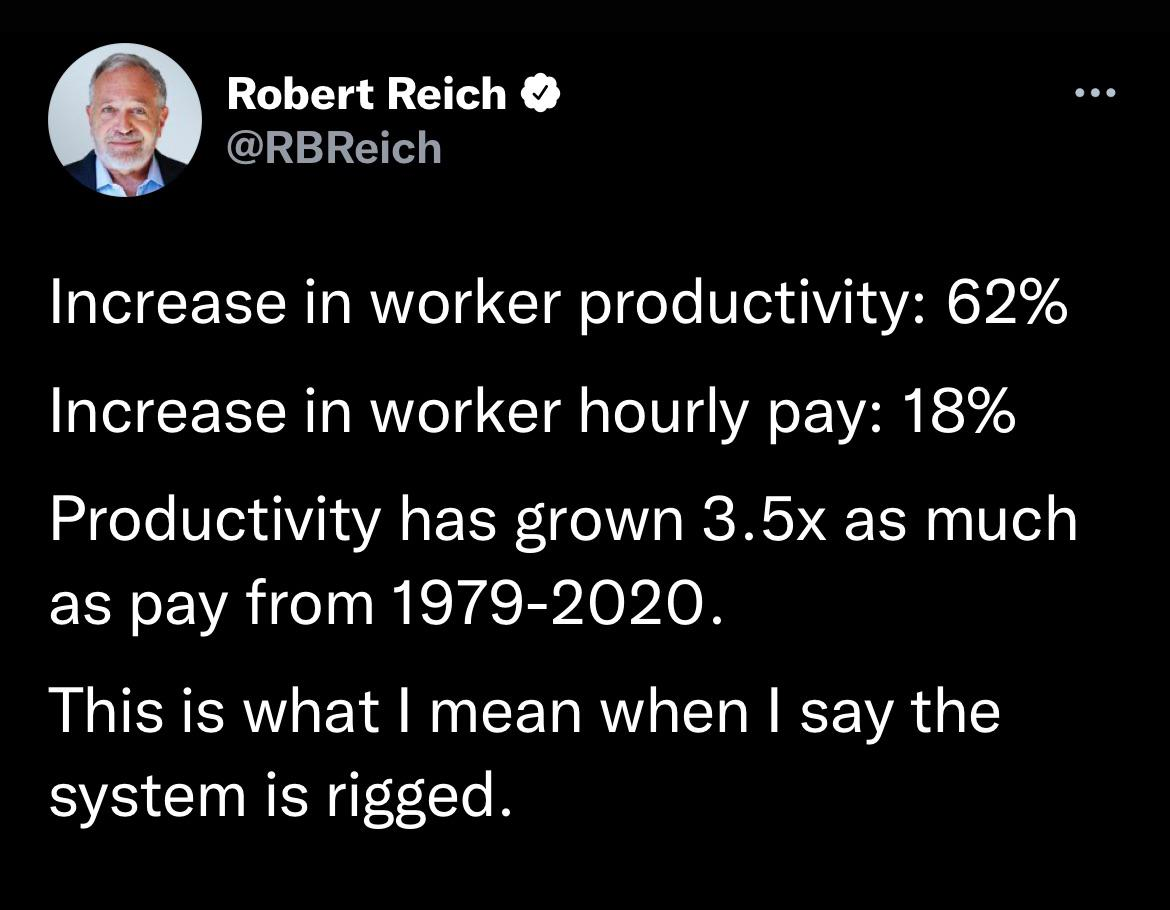this post was submitted on 18 Jun 2023
27 points (100.0% liked)
Work Reform
9966 readers
1109 users here now
A place to discuss positive changes that can make work more equitable, and to vent about current practices. We are NOT against work; we just want the fruits of our labor to be recognized better.
Our Philosophies:
- All workers must be paid a living wage for their labor.
- Income inequality is the main cause of lower living standards.
- Workers must join together and fight back for what is rightfully theirs.
- We must not be divided and conquered. Workers gain the most when they focus on unifying issues.
Our Goals
- Higher wages for underpaid workers.
- Better worker representation, including but not limited to unions.
- Better and fewer working hours.
- Stimulating a massive wave of worker organizing in the United States and beyond.
- Organizing and supporting political causes and campaigns that put workers first.
founded 1 year ago
MODERATORS
you are viewing a single comment's thread
view the rest of the comments
view the rest of the comments

By what scale? Medieval peasants only had to pay 10% in taxes and got sooooo much free time. Technology even today is still bad for us, but nature and free time? Come on, what's the point of having all these gadgets and what not if we don't have the time to use them, and they're all run by faceless corporations who make things as addictive and monetized as possible?
Productivity. That's what you want to compare to wages, and it has definitely increased faster than wages, so why aren't the workers being paid proportionately to their increased productivity?
They also had no access to information or medicine, no human rights, no nutrition, no healthcare of any kind, and only expected to live to the age of 50 if they were lucky. Also "10% taxes" is laughable considering under serfdom peasants were basically considered the property of the landed nobles.
Productivity improves the value of the basket of goods that we all consume.
...uh okay?
So back to my questions, by what scale?
Care to have a conversation and not just repeat random excerpts you read from a textbook?
So tell me, how exactly are we expected to consume all those goods in that basket that are used to measure inflation, when we are not paid in proportion to our increased productivity? Do those goods just pay for themselves with wages we do not receive?
I'm just sharing my experience. I don't have any data to back up my statements, sorry.
Experience? If you say so, again just sounds like you're quoting a textbook.
If you're referring to experience all the way back to your quality of life comment, how old are you? Quality of life has definitely dropped since baby boomers were in their 20s and 30s and 40s
Sure we have netflix, we're all interconnected and have instant access to information on the internet, but we can't raise a family on a single income, we can't pay off college or university with a single year of a summer job
What textbook? I'm just some guy on the Internet.
In what way has quality of life dropped? We wouldn't be having this conversation 10 years ago. I enjoy being able to experience an open source platform such as Lemmy, from my smartphone while getting drunk and lounging about at home. I couldn't have done that without advancements in technology. I feel like that improves my quality of life at no cost. An example of how my life is improved, regardless of wages.
I'm paying devils advocate. I'm all for wages increasing for the average person. I just want people the feel happy for all the amazing things we have in our modern world.
Something has definitely gone screwy and we've definitely not gotten the balance right - but equally I'd tend to agree that QoL has substantially improved since the 70s. Air quality, many medical advances, many more people in less labour intensive jobs, safety and quality of products has also improved substantially. General societal attitudes towards women and minority groups is better as well as all the tech and toys.
Housing is messed up and there's seemingly been a shift towards the rich, the taxes imposed on the wealthiest in society has been reduced and income inequality has increased. We may or may not be more stressed (I tend to think we are) and capitalism in general has shifted from worker first to shareholder first.
The stats above definitely don't tell the whole story either, doubling productivity while reducing price, for instance, may increase access to a product to consumers with no net gain to the company and while this is almost certainly not the case in every scenario, it just shows we can't just cherry pick stats blame all of society's ills on them.